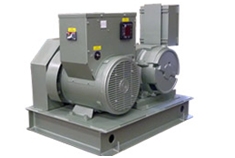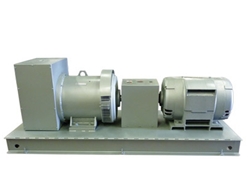Home › Electrical Engineering Forum › General Discussion › Frequency conversion in electrical power systems
- This topic has 3 replies, 3 voices, and was last updated 6 years, 4 months ago by
brownenergygroup.
-
AuthorPosts
-
2016/04/19 at 10:12 am #11306
admin
KeymasterHi everybody, let A.N (one of the professional from the community) tell us about frequency conversion in electrical power systems.
If you know a topic very well and you want to share the knowledge here, do like him and send the team a mail.
Introduction
The frequency conversion in electrical power systems is often required when the load is designed and rated for a different frequency other than that of the utility mains or from any other source. The frequency converters take in the AC power at one frequency and voltage and then provide an output power at a different frequency, and equal or different voltage.
Some equipment designed to operate on a certain frequency may not function efficiently when powered on a different frequency. The power frequency conversion increases the compatibility of equipment and applications designed to operate at different frequencies such as;- 50 Hz / 60Hz AC mains – domestic and commercial applications depending on the country
- 100 Hz for rail vehicles
- 400Hz for the aerospace industry and ultra large mainframe computers
- Higher frequencies for induction heating and some laboratory applications
The effect of using a different frequency can be significant in some equipment. For example, electric motors are usually designed to run on a specified frequency and the RPMs are directly proportional to the frequency.
If a 60Hz motor is powered using 50 Hz power supply, the decreased frequency slows down the motor by 20 %. This converts to a 20 % power reduction which may be good, however V/Hz ratio will rise and the magnetic structure of the motor may become overloaded during some parts of the power line cycle.Other sensitive electronics, domestic equipment such as refrigerators and industrial process equipment may malfunction due to the difference in power supply frequency and the design frequency. A combination of 50 Hz and 60 Hz motors supplied on one frequency and where operations are based on certain timings, may not function at all.
The frequency conversion ensures that all the electrical equipment are supplied at their design frequency and continue to operate efficiently as designed.
The two basic types of frequency converters are;- Rotary frequency converter that of a motor-generator combination
- Solid state using electronic components
The two types differ in the mode of operation, capability and features. These and other factors determine which type is best suited for a particular application.
The rotary power frequency converters use the input electrical power to run a motor which spins a generator to produce an output at the desired frequency. The rotary converters are classified as either:- Belt driven,
- Direct coupled or coupled inline
- Single or common shaft
Belt coupled motor generator sets
[caption id="attachment_10121" align="aligncenter" width="235"]
Figure 1: Belt coupled frequency converter | image: georator[/caption]
The belt coupled motor generator sets are the simplest and least expensive. The sets uses drive belts and pulleys to couple the drive motor to the generator. This arrangement transfers the energy from the motor, changes the frequency depending on the pulley ratio. In addition, it provides voltage and/or phase conversion. The set can convert to 50, 60 or 400Hz frequency.
The belt coupled can use either the induction or synchronous motors. The induction motors are inexpensive and highly accurate; on the other hand, the synchronous have higher accuracy but are more expensive.
Coupled Inline (Direct coupled) motor generator set
This uses mechanical inline coupling to directly attach the motor shaft to the generator shaft. The output frequency is dependent on the adjustable rotational speed of the generator. The speed is varied using conventional motor starter or an adjustable speed electronic drive.
[caption id="attachment_10122" align="aligncenter" width="248"]
Figure 2: Direct coupled frequency converter | image: georator[/caption]
Single shaft (Common Shaft) rotary frequency converter
This is one of the most complex, precise and reliable rotary frequency converters. The converter has both the synchronous motor and synchronous generator rotors sharing a common shaft. The frequency conversion is achieved by using different electrical poles for the motor and the generator windings.
A typical example is using a 12 pole motor and a 10 pole generator convert from 60 Hz to 50 Hz.
Frequency converters by application
400Hz Frequency converters
These are used to convert the utility mains frequency from 50 or 60 Hz to the 400Hz frequency for use in airplanes when they are on the ground.Shore to Ship frequency converters
These converts the frequency of the shore side power to that of the ship docked at the port. The shore frequency converters are necessary since the ship is likely to go to different countries using different frequencies which can either be 50 or 60 Hz.Summary
The power frequency converters are necessary in ensuring compatibility for different equipment designed for different countries.
In addition, it helps it provides a means of using the readily available AC mains supply, to provide power to specialty laboratories, aerospace and marine industries.
2017/09/22 at 6:20 am #18441pradeepkumar
ParticipantPrimary function of a frequency converter in aquatic applications is to provide energy savings. By controlling speed of a pump rather than controlling flow through use of throttling valves, energy savings can be substantial.
2018/05/30 at 7:01 am #19089pradeepkumar
ParticipantFirst try to understand, When choosing a frequency converter understanding the equipment’s requirements and capabilities is key to finding the right fit. If the equipment is required to perform in an international environment, weigh the cost of the converter against the cost of replacing the equipment to be powered..
Inductor Coil Manufacturer in India
2018/10/16 at 3:59 pm #19516brownenergygroup
ParticipantWhat is the largest that a frequency converter can handle in KW/MW electrical output ?
-
AuthorPosts
- You must be logged in to reply to this topic.

 Figure 1: Belt coupled frequency converter | image: georator[/caption]
Figure 1: Belt coupled frequency converter | image: georator[/caption] Figure 2: Direct coupled frequency converter | image: georator[/caption]
Figure 2: Direct coupled frequency converter | image: georator[/caption]